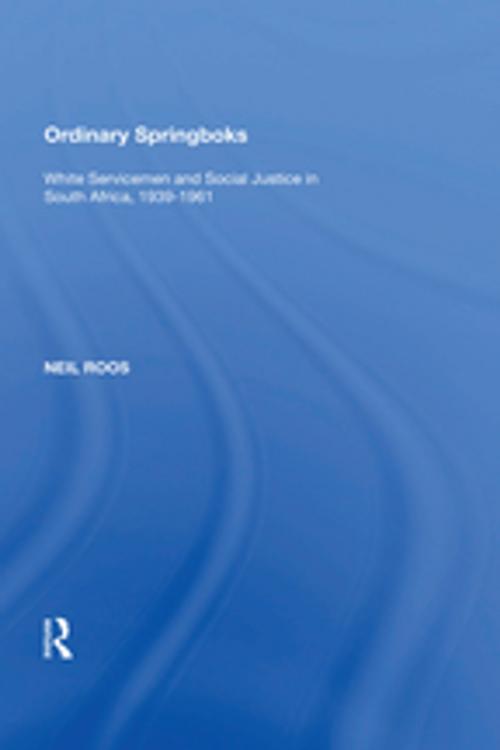Ordinary Springboks
White Servicemen and Social Justice in South Africa, 1939-1961
Nonfiction, History| Author: | Neil Roos | ISBN: | 9781351152020 |
| Publisher: | Taylor and Francis | Publication: | February 6, 2018 |
| Imprint: | Routledge | Language: | English |
| Author: | Neil Roos |
| ISBN: | 9781351152020 |
| Publisher: | Taylor and Francis |
| Publication: | February 6, 2018 |
| Imprint: | Routledge |
| Language: | English |
'Springbok' was a term used to describe the 200,000 white South African men who volunteered to serve during the Second World War. Volunteers developed bonds of comradeship, and rites of passage were expressed in the idiom of 'the front'. Without exception, volunteers nurtured hopes for some form of post-war 'social justice'. Neil Roos provides a fresh approach in considering comradeship and social justice ethnographically, as a way of focusing on ordinary Springboks' expectations and experiences during and after the war. As troops were demobilized, the contradictions of social justice in a colonial society were exposed. The majority of white veterans used the memory of service to stake their claim as white men who had served their country, and to negotiate a better position for themselves within the context of segregated colonial society. However, social justice amongst white veterans did not necessarily assume a racist character. A small group of radical white veterans invoked their war experience and traditions of anti-fascism to challenge the very precepts of racialized South African society. These veterans featured in the struggle against apartheid during the 1950s, and were especially prominent in the shift towards armed resistance to apartheid in 1961. Drawing heavily on the testimony of veterans, the book includes previously unreferenced documentary and visual material on the history of white servicemen, including official responses such as military intelligence reports on the political mood of serving soldiers, as well as material produced by veterans' organisations, such as the Springbok Legion, the War Veterans' Torch Commando and the Memorable Order of Tin Hats (MOTH). Roos offers a new framework for examining the social, cultural and political history of whites (and whiteness) in South Africa. The book will appeal to those interested in the elaboration of apartheid society and the types of acceptance and resistance that it engendered, and will also co
'Springbok' was a term used to describe the 200,000 white South African men who volunteered to serve during the Second World War. Volunteers developed bonds of comradeship, and rites of passage were expressed in the idiom of 'the front'. Without exception, volunteers nurtured hopes for some form of post-war 'social justice'. Neil Roos provides a fresh approach in considering comradeship and social justice ethnographically, as a way of focusing on ordinary Springboks' expectations and experiences during and after the war. As troops were demobilized, the contradictions of social justice in a colonial society were exposed. The majority of white veterans used the memory of service to stake their claim as white men who had served their country, and to negotiate a better position for themselves within the context of segregated colonial society. However, social justice amongst white veterans did not necessarily assume a racist character. A small group of radical white veterans invoked their war experience and traditions of anti-fascism to challenge the very precepts of racialized South African society. These veterans featured in the struggle against apartheid during the 1950s, and were especially prominent in the shift towards armed resistance to apartheid in 1961. Drawing heavily on the testimony of veterans, the book includes previously unreferenced documentary and visual material on the history of white servicemen, including official responses such as military intelligence reports on the political mood of serving soldiers, as well as material produced by veterans' organisations, such as the Springbok Legion, the War Veterans' Torch Commando and the Memorable Order of Tin Hats (MOTH). Roos offers a new framework for examining the social, cultural and political history of whites (and whiteness) in South Africa. The book will appeal to those interested in the elaboration of apartheid society and the types of acceptance and resistance that it engendered, and will also co















